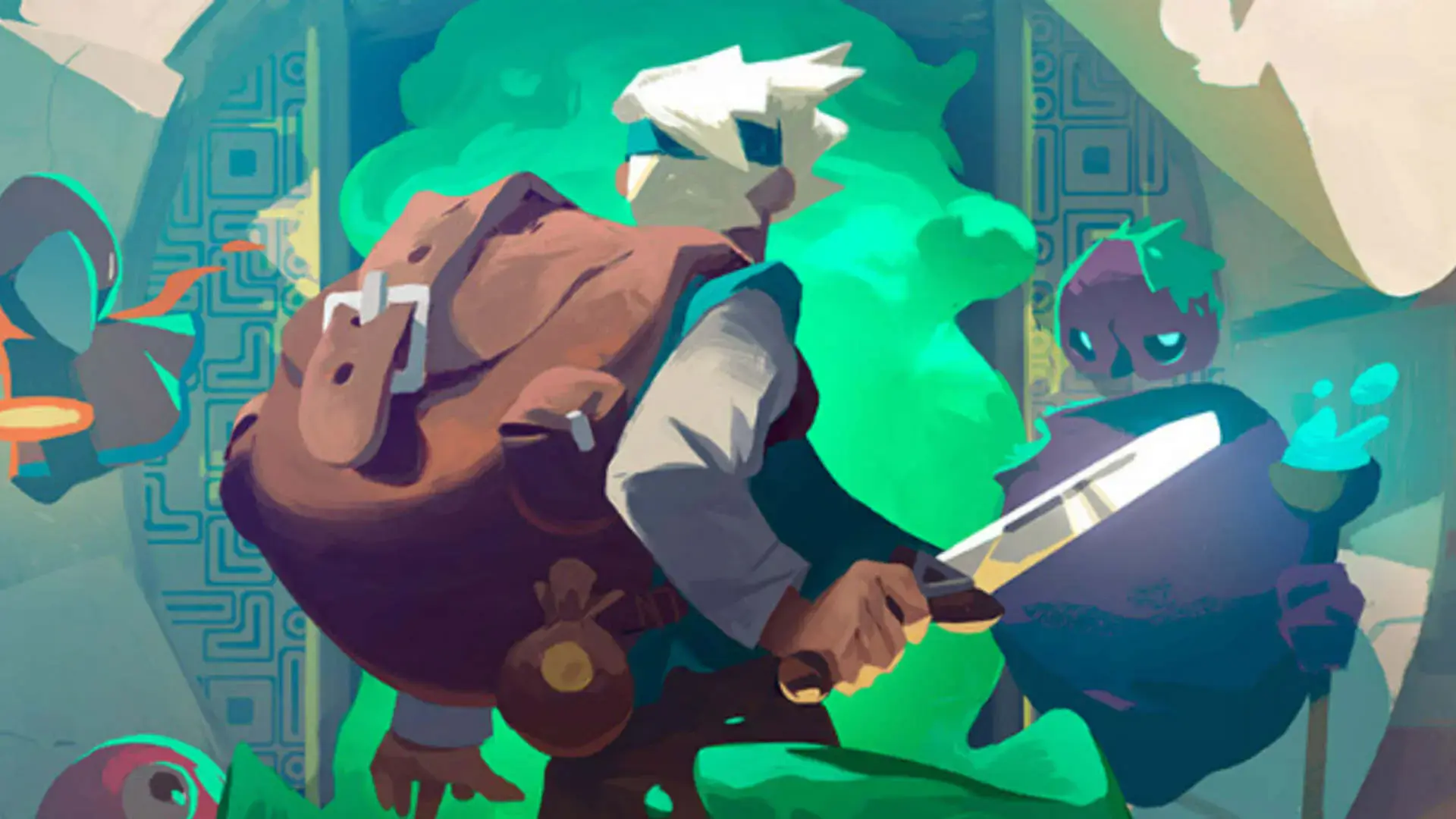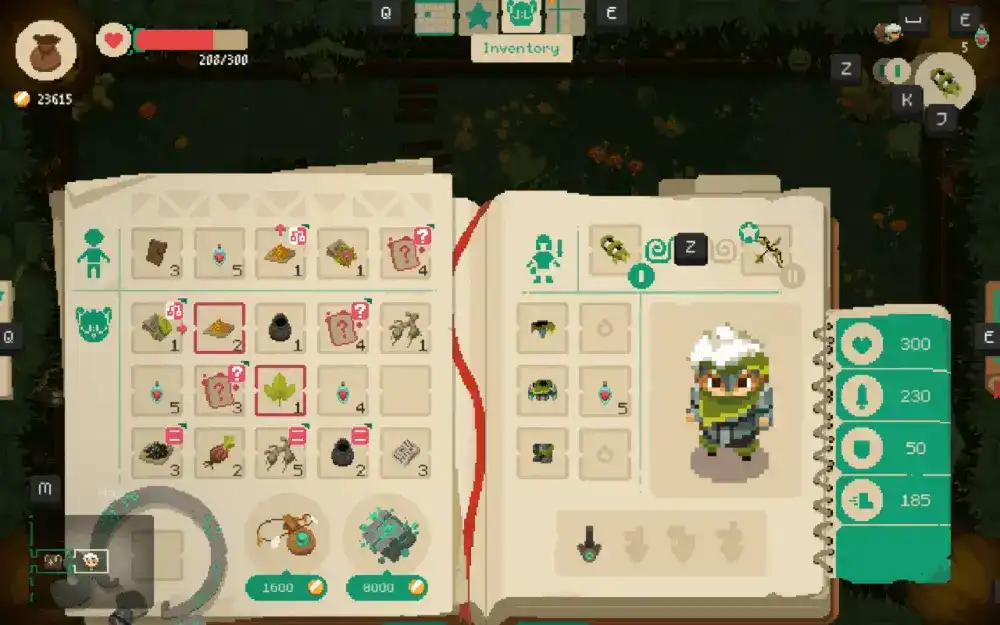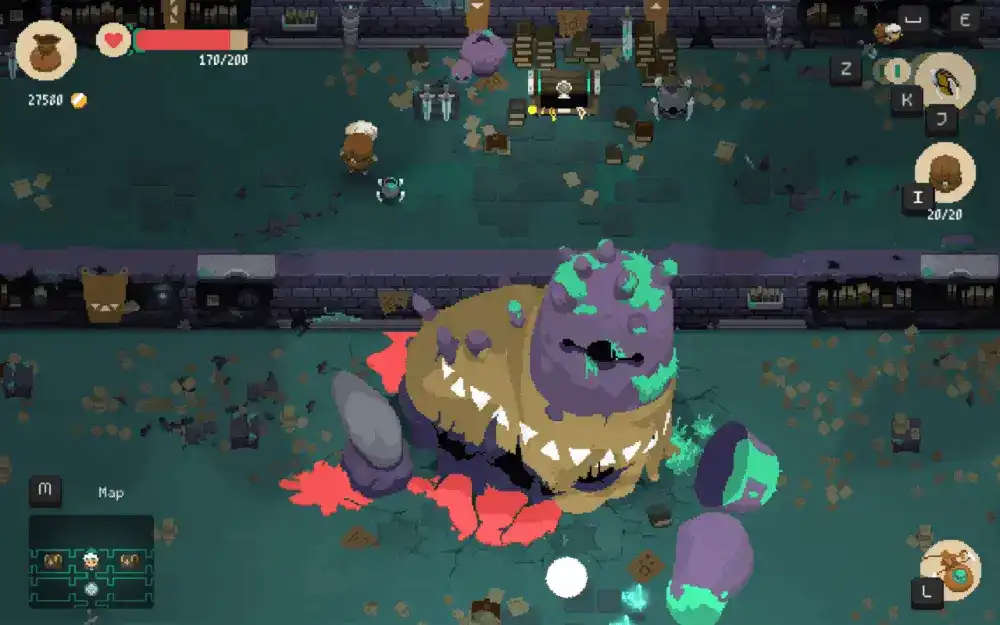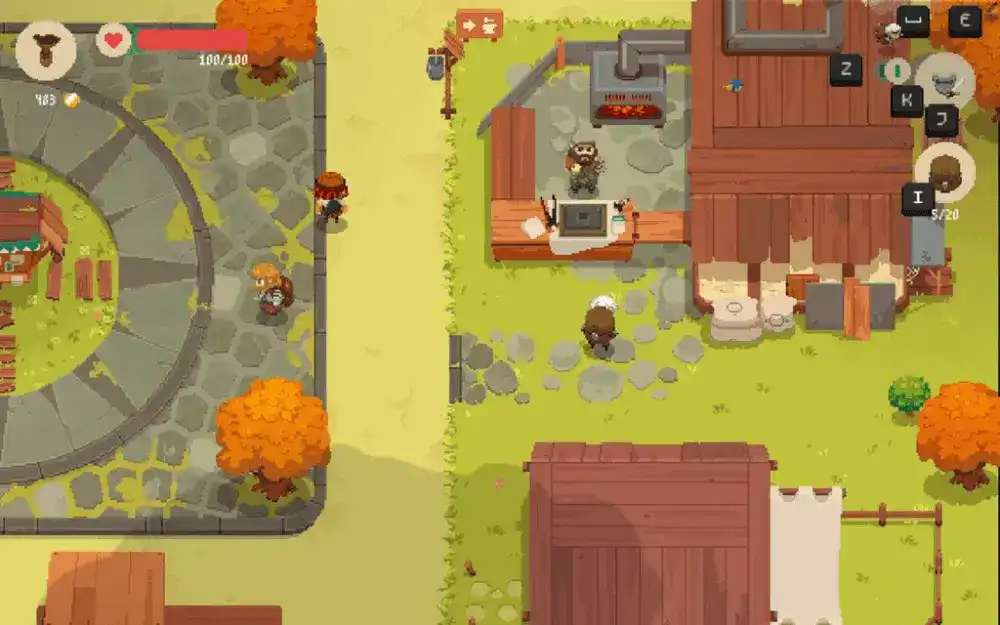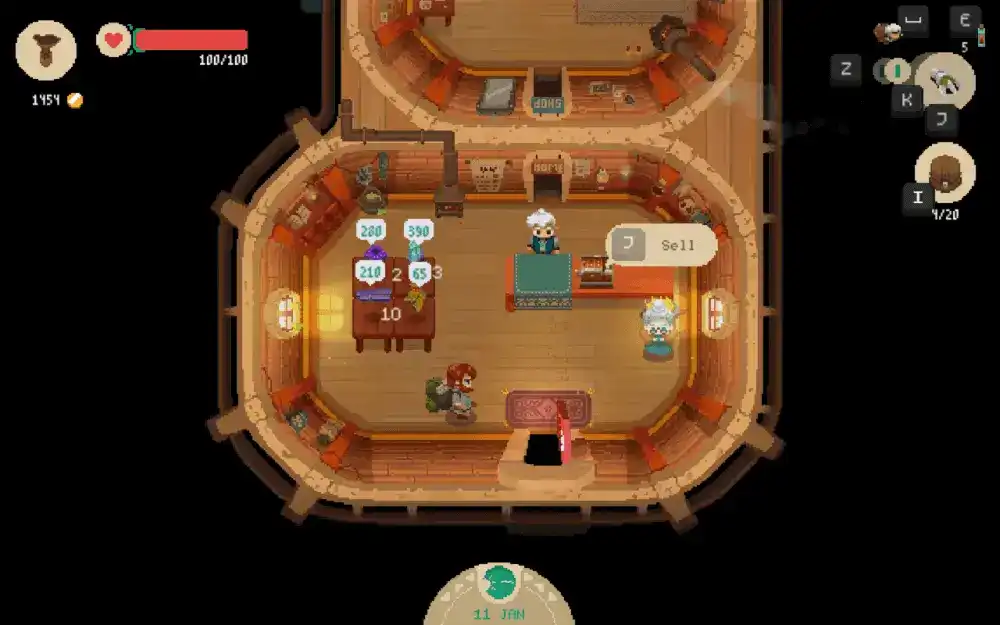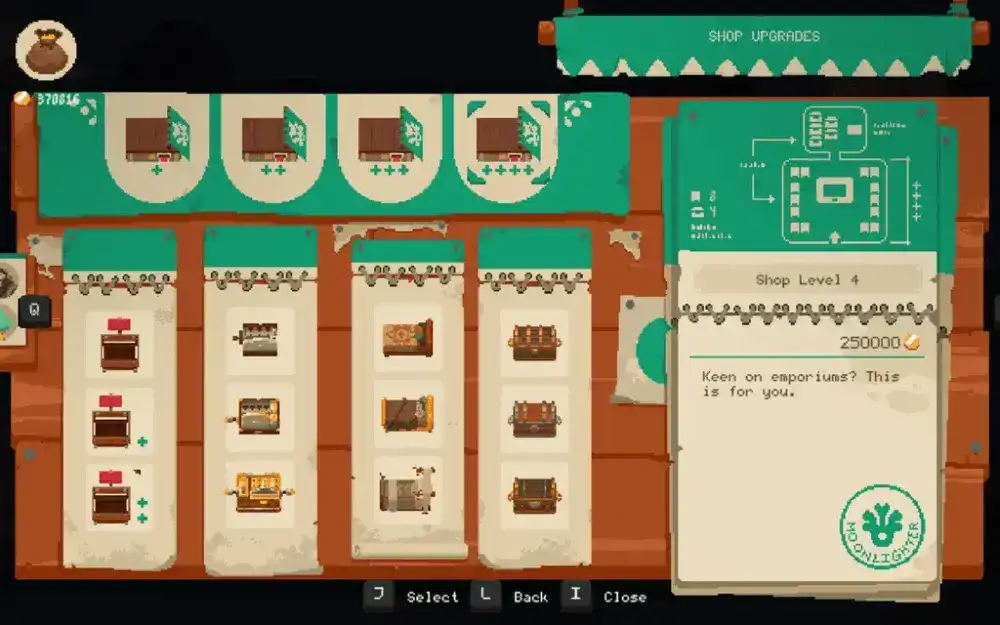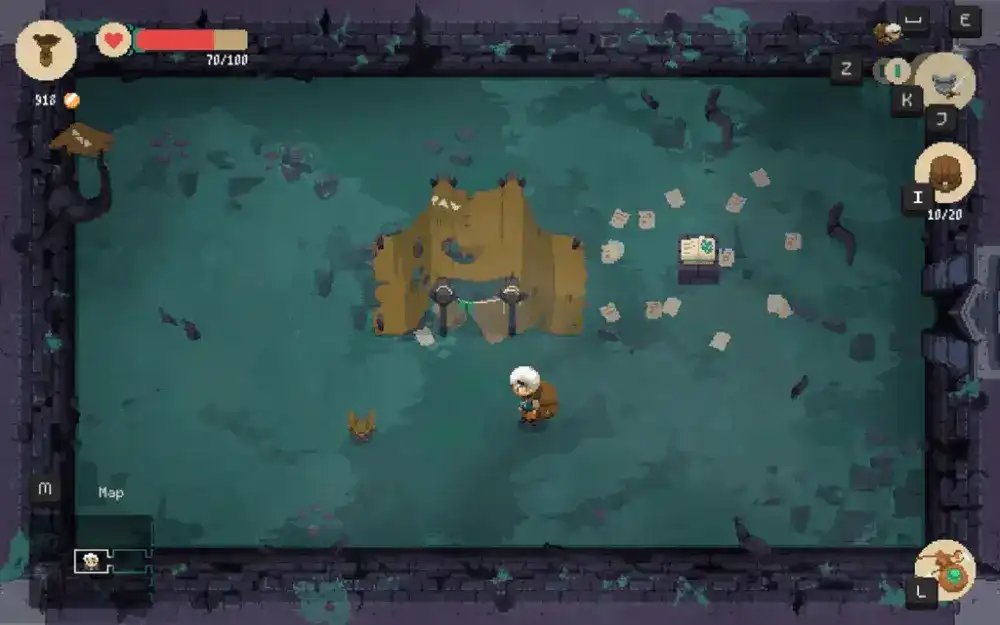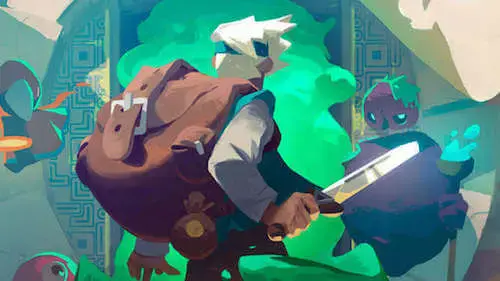We all have our day jobs, but some also live with ambitious dreams of what could be. In Moonlighter the protagonist, a shopkeeper named Will, does more than just dream about his goals.
In order to discover the secrets of the small town of Rynoka, he makes a living in his family's shop — The Moonlighter — by day and explores the dungeons by night, aiming to unlock the fifth and most dangerous one at the end of it all.
His reckless bravery and desire to venture out no matter the circumstances lead him to end up facedown with a broom in hand, his only weapon at the beginning of his journey.
Stardew Valley... as an Action Game
Moonlighter is an action-oriented alternate reality of Stardew Valley. Whereas on the farm, I grew crops, socialized with townspeople, and only spent a minor portion of my day in the mines, in Rynoka, I spent all night in the dungeons, only spending a bit of time in the day in the shop selling the wares I gathered by defeating dozens upon dozens of monsters the night before.
There is plenty to keep Will busy outside of his work, with four dungeons of different environments to progress through before gaining all the keys needed to unlock the fifth, most mysterious one. Each dungeon will house either Golem, Forest, Desert, or Tech, complete with their own set of enemies and bosses, and gradually increasing in difficulty.
As your night in the dungeon drags on, your inventory will no doubt become packed as you pick up more and more items. Along with the difficulty increase comes a proportional increase in the value of materials and the amount of curses on them threatening to harm other materials in the bag, forcing you into some inventory Tetris in an attempt to try and take it all back with you.
Hopefully, you don't get beaten by a boss and spat back up in town, losing nearly all the painstakingly sorted items that you dodged and slashed at monsters to gain. If you do, it's not such a big deal since the combat is so satisfying you'd probably play through the dungeon multiple times anyway.
The dodging is quick and responsive, and the simple combos you land in between make you feel like a pro as you make progress on the monsters' health bars. As your own health bar dwindles, don't fear death; take comfort in the fact that you'll likely succeed in making it all the way through the dungeon the second or third time in about 15 minutes per attempt.
Character Progression
If you find yourself dying too often, you may want to consider crafting potions at the potion brewer in town, or upgrading Will's armor and weapons at the blacksmith with the materials you gained from the dungeons — before he ends up face-planting in failure again.
Unlike some RPGs, Will does not gain character stats or level up. Instead, the character progression is through the economy and resources, which I find to be fitting for a game made unique by its shopkeeping and economy.
Although there exist all the typical RPG-type weapons to choose from, allowing you to adjust Will's attack, movement, and defense to your play style, upgrades are very linear with little room for customization. However, it gives you all you need to tweak combat to your play style and make it more satisfying than it already is.
To get into the specifics, there are three types of armor: fabric, iron, and steel. The design progresses as you gather materials from each dungeon that the upgraded armor is paired with.
To varying degrees, the different sets of armor give boosts or decrements to health, defense, and movement. For example, fabric is the lightest type, which allows for faster dodging in the form of Will's graceful tumbles at the expense of good defense.
In terms of weapons, there are two types: regular and elemental. The latter trades some attack points for a chance to activate a special elemental effect, such as stuns. I felt that both gave me the same chance of winning, but one was usually better adjusted to my play style.
Personal Finance and Investment
No, you're not on a finance site. You're still reading about Moonlighter, but this is seriously an important part of the game. A big selling point of this game is... well, the selling. Though Will dungeon-dives at night, he sells materials gained from monsters and bosses to appreciative townsfolk during the day.
You'll spend a good portion of time in the store restocking items and figuring out the sweet spot for prices that suit the customers' demands. The Rynoka economy uses some basic economics here — if you give too much supply, the demand and price will go down. If you make the item appear more rare by hardly restocking it, the demand will go up and so will the price.
As time goes on and your store gets more popular, you'll have more trouble to deal with in the form of customers asking questions, or thieves and creatures getting into your store. These become mere nuisances that you might wish weren't there, but I personally found them charming, making the shop more realistic and less monotonous — I mean, imagine standing at the register all day pressing one button.
Eventually, Will's store becomes so successful (and he becomes such an experienced dungeoneer) that he has boatloads of money and not enough space for all the things he needs to sell. At this point, the shop can be upgraded to increase the amount of space for stock, upgrade the displays to attract different customers, and add decor for bonuses.
Towards the end of the game, when you have too much money and nothing to do with it, you can try your luck in the stock market when you upgrade the town enough to get a banker. See, I wasn't joking about personal finance and investment.
Story? Quests? What About Those?
Yeah, I asked the same thing for majority of the game. Unfortunately (or fortunately, for some), the story and quests turn out to be a very small part of the game.
As you wander around town and talk to NPCs, you'll find they don't have too much to say other than progressively giving you perspective on the fame of your shop and yourself. The most context you'll get is from his childhood friend who divulges a few childhood antics of the past.
In the dungeons, a famous past explorer who went missing left short readable notebooks behind with tales and cryptic passages. But don't expect too much information from those either.
The crux — probably about 90% — of the story is at the end. I won't spoil that for you, but those 30 minutes at the end of the game will be the most story and dialogue you'll get. Without revealing too much, I will say it's a very amusing 30 minutes, and I only wish there were more of it throughout.
The quests don't add much to the game either. To get quests, you'll have to upgrade your shop to the point where other explorers start asking you for certain materials. In exchange, they'll give you a relatively small sum of money.
There was no essence or story behind the quests. I always found them to be more trouble than they were worth, so I only ever bothered doing a few of them. The ones I did do were done because I already had the materials, or miraculously had enough precious inventory space in my bag to spare for a quest item.
This portion of the game definitely had more potential, but there was at least enough story and mystery around the secrets of the last dungeon to keep me interested and curious to explore, to figure out just what the big secret inside of Rynoka was.
The Finishing Touches
As you'll come to learn, I'm a sucker for pixel art, and the art and effects in this game were exactly my cup of tea — or my poison, considering how much of my attention games like this end up taking. When I found this gem browsing Steam, I watched Will roll around through dungeons, saw his cute little shop, and knew I couldn't resist. Once I started, I was a goner for weeks.
The pull to open the next dungeon and see what new environments awaited me kept me glued to the game. I wondered how the next dungeon's theme, hinted at by its external facade and its name would affect the next wave of monsters and the dungeon's final boss. I wanted to see how much I could get away with selling the dungeon items for and what the next shop upgrade would look like.
Digital Sun's Moonlighter is one of the most simple and explicitly linear action RPGs I've played that wasn't a mobile game, yet packed with content that kept me saying "just one more night, and I'll get off" (I didn't).
Whether it's the fact that you start with a broom, or that you eventually get to have a little Roomba to kick around, it's the little things that really make game worlds like Moonlighter as exciting and amusing as they are. Seeing Will progress from broom-wielding ambitious shopkeeper to sword-wielding hero (who is probably a multi-millionaire) is a clear reflection of not only all the adventures you've been on, but also of Will and The Moonlighter's growth.
From broom-wielder to Roomba-owner, you'll no doubt have fun fighting and selling your way to victory, glory, and wealth while revitalizing the town of Rynoka — and the world — as the humble shopkeeper Will.
